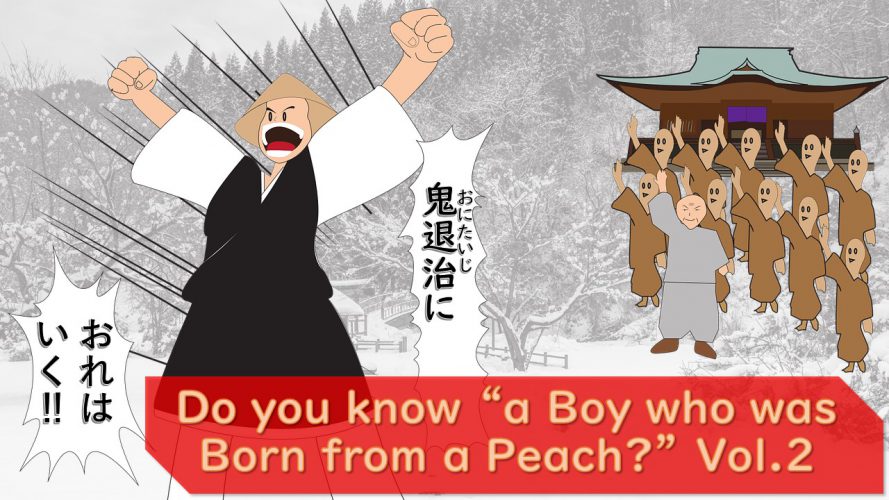JAPANESE LESSON
Do you know “a Boy who was Born from a Peach?” Vol. 2

Today, let’s read a Japanese famous old tale, “桃太郎(ももたろう).” You may know this story as “Peach boy.”
This is a series of the story “桃太郎(ももたろう)” and I recommend you to check the the previous lesson before you read this.
Last time, a boy was born from a peach and named “桃太郎(ももたろう).”
Let’s read the second part of the story in Japanese and learn Japanese.
桃太郎(ももたろう)はあっと言(い)う間(ま)に大(おお)きくなり、立派(りっぱ)な優(やさ)しい男(おとこ)の子(こ)(1)になりました。
Momotaro grew up very fast and became a decent and kind boy.
ある日(ひ)、桃太郎(ももたろう)は二人(ふたり)に言(い)いました。
One day, he said to the old man and old woman,
「鬼ケ島(おにがしま)に悪(わる)い鬼(おに)が住(す)んでいると聞(き)きました(2)。」
“I’ve heard evil demons live in Onigashima.”
「時々(ときどき)村(むら)に来(き)て悪(わる)いことをするのでみんな困(こま)っている。」
“Sometimes they come to the village and do something bad for us, so we’re in trouble.”
とおじいさんが答(こた)えると、
The old man answered.
「それでは私(わたし)が行(い)って退治(たいじ)しましょう。おかあさん、きび団子(だんご)(3)を作(つく)って下(くだ)さい。」
“Then I’ll go there and defeat them. Mom, please make some kibidango.”
おばあさんはとてもおいしい日本一(にほんいち)のきび団子(だんご)を作(つく)り、桃太郎(ももたろう)はそれを腰(こし)の袋(ふくろ)に入(い)れるとさっそく鬼ケ島(おにがしま)に向(む)けて旅立(たびだ)ちました。
The old woman made the best kibidango in Japan, which taste very delicious. Momotaro put them in his waist bag and left for Onigashima right away.
Note
(1) 立派な優しい男の子(りっぱなやさしいおとこのこ)
As same as English, we can also say “優しい立派な男の子” and it’s the same meaning.
However, Japanese language doesn’t use postpositive modifiers such as which, who and that.
For example. we can say “became a boy who is decent and kind” even though it may be wired, but Japanese people never say like that.
(2) In Japanese language, there are few differences between “past” and “present perfect.”
The translation uses present perfect because he heard about the demon and they would be there still now.
We have to consider the situation to translate Japanese past tense into English.
(3) きび団子(だんご)
きび団子(だんご) is the dumpling made from millet.
(4) とてもおいしい日本一(にほんいち)のきび団子(だんご)
We can say that Japanese language doesn’t have any postpositive modifiers.
If I translate every word, it’ll be “とても(very)” “おいしい(delicious)” “日本一の(best in Japan)” “きび団子”
All the modifiers are put before the modified.
This is the second part of “桃太郎.” He grew up and decided to defeat demons.
We have 3 more parts for this story.
I recommend you to read the story aloud in Japanese as a practice.
I hope you are looking forward to the continuation.

Leave a Comment